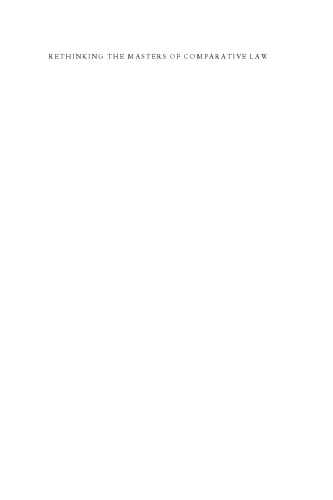

Most ebook files are in PDF format, so you can easily read them using various software such as Foxit Reader or directly on the Google Chrome browser.
Some ebook files are released by publishers in other formats such as .awz, .mobi, .epub, .fb2, etc. You may need to install specific software to read these formats on mobile/PC, such as Calibre.
Please read the tutorial at this link. https://ebooknice.com/page/post?id=faq
We offer FREE conversion to the popular formats you request; however, this may take some time. Therefore, right after payment, please email us, and we will try to provide the service as quickly as possible.
For some exceptional file formats or broken links (if any), please refrain from opening any disputes. Instead, email us first, and we will try to assist within a maximum of 6 hours.
EbookNice Team

Status:
Available4.5
28 reviews
ISBN-10 : 1841132896
ISBN-13 : 9781841132891
Author: Annelise Riles
Comparative Law is experiencing something of a renaissance,as legal scholars and practitioners traditionally outside the discipline find it newly relevant in projects such as constitution and code drafting, the harmonization of laws, court decisions, or as a tool for understanding the globalization of legal institutions. On the other hand, comparativists within the discipline find themselves asking questions about the identity of comparative law, what it is that makes comparative law unique as a discipline, what is the way forward. This book, designed with courses in comparative law as well as scholarly projects in mind, brings a new generation of comparativists together to reflect on the character of their discipline. It aims to incite curiosity and debate about contemporary issues within comparative law by bringing the discipline into conversation with debates in anthropology, literary and cultural studies, and critical theory. The book addresses questions such as what is the disciplinary identity of comparative law; how should we understand its relationship to colonialism, modernism, the Cold War, and other wider events that have shaped its history; what is its relationship to other projects of comparison in the arts, social sciences and humanities; and how has comparative law contributed at different times and in different parts of the world to projects of legal reform. Each of the essays frames its intervention around a close reading of the life and work of one formative character in the history of the discipline. Taken as a whole, the book offers a fresh and sophisticated picture of the discipline and its future. Contents: Montesquieu: the specter of despotism and the origins of comparative law (Robert Launay); Max Weber and the uncertainties of categorical comparative law (Ahmed White); Rethinking Hermann Kantorowicz: Free law, American legal realism and the legacy of anti-formalism (Vivian Grosswald Curran); Encountering amateurism: John Henry Wigmore and the uses of American formalism (Annelise Riles); Nobushige Hozumi: A skillful transplanter of western legal thought into Japanese soil (Hitoshi Aoki); Sanhuri, comparative law and Islamic legal reform, or why cultural authenticity is impossible (Amr Shalakany); Sculpting the agenda of comparative law: Ernst Rabel and the facade of language (David J. Gerber); René David: At the head of the family (Jorge L. Esquirol); Postmodern-Structural Comparative Jurisprudence? The aggregate impact of R. B. Schlesinger and R. Sacco to the understanding of the legal order (Ugo Mattei).
Part I: Founding Moments
1. Montesquieu: The Specter of Despotism and the Origins of Comparative Law
2. Max Weber and the Uncertainties of Categorical Comparative Law
I. INTRODUCTION
II. THE OUTLINES OF WEBER’S COMPARATIVE TYPOLOGY
III. NEO-KANTIANISM IN WEBER’S COMPARATIVE LAW
IV. THE INNER LOGIC OF WEBER’S COMPARATIVE LAW AND ITS UNDERPINNINGS: LUKACS AND MOMMSEN
V. WEBER AND MODERN COMPARATIVE LAW
VI. CONCLUSION
Part II: The Critique of Classicism
3. Rethinking Hermann Kantorowicz: Free Law, American Legal Realism and the Legacy of Anti-Formalis
A BIOGRAPHICAL NOTE
OVERVIEW
FREE LAW AND AMERICAN LEGAL REALISM
FREE LAW AND TYRANNY
KANTOROWICZ’S LEGACY
4. Encountering Amateurism: John Henry Wigmore and the Uses of American Formalism
AMBITION IN LOTUS LAND
LAW AND CUSTOM
A PERFORMANCE OF GAPS
CONCLUSION
Part III: The Science of Modernization
5. Nobushige Hozumi: A Skillful Transplanter of Western Legal Thought into Japanese Soil
INTRODUCTION
HOZUMI AND HIS SURROUNDINGS
“TABOOS AND LAW”
HOZUMI’S ACCEPTANCE OF FRAZER’S THEORY
HOZUMI’S REJECTION OF FRAZER’S THEORY
CONCLUSION: HOZUMI’S MERITS
6. Sanhuri and the Historical Origins of Comparative Law in the Arab World (or How Sometimes Losing
INTRODUCTION: THE STAKES IN READING SANHURI
THE POSITION OF COMPARATIVE LAW IN MODERNITY/TRADITION DISCOURSE:
THE EXPERIENCE OF MODERNITY: “L’ÉCOLE LAMBERT ÉGYPTIENNE”
THE RECONSTRUCTION OF TRADITION: THE INVENTION OFISLAMIC LAW AND ARCHITECTURE
CONCLUDING REMARKS: DENIAL IS A RIVER IN EGYPT
7. Sculpting the Agenda of Comparative Law: Ernst Rabel and the Facade of Language
THE PATH TO COMPARATIVE LAW
THE COMPARATIVE LAW PROJECT: RABEL’S ROLES AND CONTEXTS
LAW, DISSOLUTION AND HOPE: RABEL’S STATED AIMS
LANGUAGE AS BOTH FACADE AND RESPONSE: COMPARATIVE LAW’S METHODS
THE ROAD TO ORTHODOXY
IMPLICATIONS FOR LOCATING CONTEMPORARY COMPARATIVE LAW
CONCLUDING PERSPECTIVES
Part IV: Mid-Century Pragmatism
8. René David: At the Head of the Legal Family
I. SALVAGING LIBERAL LAW
II. SOVIET LAW GOES WESTERN
III. UNIDROIT FOR ALL
IV. CONTINUING INFLUENCE
9. The Comparative Jurisprudence of Schlesinger and Sacco: A Study in Legal Influence
INTRODUCTION
DATA GATHERING
TRANSPLANTS, ORIGINALITY AND INFLUENCE
MODERNISM, POSTMODERNISM AND TWO MEANINGS OF POSITIVISM
rethinking comparison
rethinking the concept of law of nature
rethinking law boston review
masters comparative religion
rethinking comparativism
Tags: Rethinking, The Masters, Comparative Law, Annelise Riles